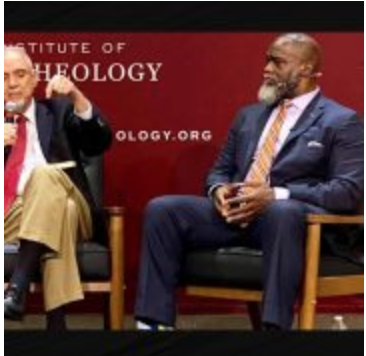Is God In Hell?
By: Slow to Write Topic: theologyThis topic is probably not what you were expecting to read about on Good Friday. I wasn’t planning on writing about this either—until late last night, when I read social media posts saying I was a false teacher.
This is because last night The Spillover podcast (with my friend Alex Clark) released a clip of our discussion on the end times and hell. In the clip, I said:
“Hell is actually the presence of God, but in his wrath. Frankly, the most terrifying thing about hell is that God is there…except all of his kindness and his mercy and his grace [are] not.”
Alex and I talked about the antichrist, Catholicism, Christless conservatives, and the exclusivity of Christ—so I knew many of the things I said in our discussion would be considered controversial. However I never imagined that my words about God’s presence in hell would be the most controversial.
It’s basic Christian theology. Unbelievers aren’t the only people in hell. God is there with them. God is in hell.
That isn’t blasphemous, it’s Biblical.
Some people reference 2 Thessalonians 1:9, claiming it explicitly contradicts my words. But that’s because they’re misinterpreting that Bible verse. In 2 Thessalonians 1:9, the Apostle Paul says:
“They will suffer the punishment of eternal destruction, away from the presence of the Lord and from the glory of his might.”
That Bible verse isn’t saying God isn’t present in hell. It’s saying unbelievers will be away from God’s glorious presence in heaven. It’s not saying that God will be away from their curse in hell, it’s saying that they will be away from God’s blessing in heaven.
What the Apostle Paul says in verses before and after verse 9 is clarifying. In 2 Thessalonians 1:8, the Bible says Jesus will be “inflicting vengeance” on unbelievers in hell. If God isn’t present in hell, how is he inflicting vengeance—now and forever—on unbelievers?
Another Bible verse that people misinterpret is Matthew 25:41. It says: “Then he will say to those on his left, ‘Depart from me, you cursed, into the eternal fire prepared for the devil and his angels.’”
But like 2 Thessalonians 1:9, that Bible verse isn’t suggesting that unbelievers will be physically away from God’s presence. It’s saying that since they’re cursed, they will be forsaken by God.
Think about that. My wording is deliberate. What does it mean to be forsaken by God? Does it mean the absence of God? No, it means the presence of his wrath.
That’s what happened on Good Friday 2,000 years ago, right? When Jesus was on the cross, he quoted Psalm 22:1-2, which says:
“My God, my God, why have you forsaken me? Why are you so far from saving me, from the words of my groaning? O my God, I cry by day, but you do not answer, and by night, but I find no rest.”
Does that mean God’s presence wasn’t on Earth at that time? If so, then what about Jesus? Isn’t he God? Also, if being forsaken by God means he isn’t present in any way, then why was the veil in the temple (his earthly dwelling place) torn into two immediately after Jesus’ death? (Matthew 27:50-51)
When Jesus says he was forsaken by God, he meant that—like people in hell—he became a curse. That’s why Galatians 3:13 says: “Christ redeemed us from the curse of the law by becoming a curse for us.”
He was suffering the wrath of God. He became a curse. It doesn’t mean God’s presence wasn’t there with him.
Psalm 22 actually gives us the most clear meaning of what it means to be forsaken or away from the presence of God. Psalm 22:1-2 says:
“My God, my God, why have you forsaken me? Why are you so far from saving me, from the words of my groaning? O my God, I cry by day, but you do not answer, and by night, but I find no rest.”
People who are away from the presence of God in hell are not physically away from God—they’re away from his salvation. They’re away from his grace and mercy.
They’re not away from his wrath. They’re not away from his judgement. They’re not away from his presence.
Revelation 14:9-11 says:
“And another angel, a third, followed them, saying with a loud voice, ‘If anyone worships the beast and its image and receives a mark on his forehead or on his hand, he also will drink the wine of God’s wrath, poured full strength into the cup of his anger, and he will be tormented with fire and sulfur in the presence of the holy angels and in the presence of the Lamb. And the smoke of their torment goes up forever and ever, and they have no rest, day or night, these worshipers of the beast and its image, and whoever receives the mark of its name.’”
The most terrifying thing about hell isn’t the lake of fire. It isn’t the unfathomable darkness. It isn’t the unending, eternal torment.
The most terrifying thing about hell is God.
That shouldn’t surprise us. God is omnipresent. He’s everywhere. As King David said: “Where shall I go from your Spirit? Or where shall I flee from your presence? If I ascend to heaven, you are there! If I make my bed in Sheol, you are there!” (Psalm 139: 7-8)
The creator’s presence is in every corner of his creation, including hell. Everywhere in creation, he’s king. So hell isn’t an anarchy. There is only one ruler in hell, and his name isn’t Satan. After all, who do you think will throw Satan into the lake of fire? (Revelation 20:10)
So this Good Friday, please receive the good news of Jesus Christ. He suffered the wrath of God on the cross so that if we believe in him, we wouldn’t suffer the wrath of God in hell.
Please repent and believe in him. If you do that, you will spend an eternity with him in heaven. If you don’t, you will spend an eternity with him in hell.





